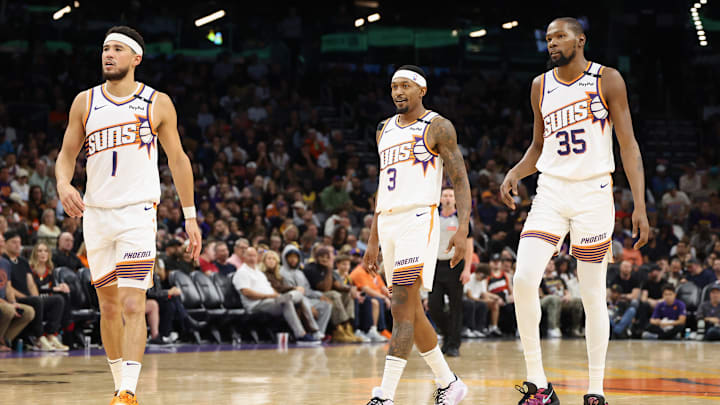At the top of the rotation, the Phoenix Suns are as talented as any team in the NBA. At a time when depth has become essential, Phoenix has gone against the grain by building a big three of All-Star players, creating a monster of a trio with Bradley Beal, Devin Booker, and Kevin Durant.
Unfortunately, two seasons later, the Suns can't possibly ignore the crushing reality that depth is king in the modern NBA—and a three-headed monster is only as effective as its best game.
It's an unfortunate truth for Phoenix to accept, but it's a deliberate result of the NBA's response to the big three era. Changes to the CBA and salary cap structure have incentivized depth, and the teams who have ignored their hubris have benefited immensely.
Look no further than the defending champion Boston Celtics, which have complemented Jaylen Brown and Jayson Tatum with a deep cast of players who routinely step up in a pinch.
Furthermore, the Cleveland Cavaliers and Oklahoma City Thunder won a combined 132 games in 2024-25 by embracing the need for a deep rotation. For that matter, the Houston Rockets overcame the absence of a true go-to scorer with that same philosophy—and 52 wins later, they ended a five-year postseason drought.
There's a sincere case to be made that the Suns could've defeated any one of those teams if they'd stayed healthy, but therein lies the very truth they've been so desperate to ignore.
Suns' absence of depth precipitated unsustainable pursuit of glory
No matter how talented a team's big three may be, the absence of depth is destined to create unsustainability. The counter point is often that a healthy big three can overcome any challenge set against it due to the sheer quality of the players at the top of the rotation.
Unfortunately, that theory requires all three max-level players to maintain a clean bill of health and pristine availability unless high-level role players decide to sign on to play with them at a much lower price than they'd otherwise command.
Perhaps a team will achieve the modern day equivalent of the Miami Heat signing Ray Allen, Chris Andersen, and Shane Battier for less than $6.6 million—combined. The harsh reality facing Phoenix, however, is that it pays more than ever to be a high-level role player, let alone a star at the tail-end of their career.
The odds of filling out the rotation with the perfect pieces on team-friendly deals simply because the stars attract them are lower than ever before.
Role players are respected more in 2024-25 than they've ever been. It's a direct result of the new standards set for winning, as a team that can't go seven-to-eight players deep for quality minutes is destined to fall short of expectations.
As such, the players who make that possible are hitting the open market with stronger opportunities to make the kind of money previous generations wouldn't have allowed them to earn.
Beyond the money, the issue of talent, consistency, and fit are impossible to ignore. It's rarer than advertised that all three stars will be at their best, meaning supporting players will need to step up any time a tough opponent arrives to challenge them.
If Phoenix is going to make a full recovery from a disastrous 2024-25 season, then it needs to accept the value of depth in favor of the three-headed monsters it's been desperate to construct.
